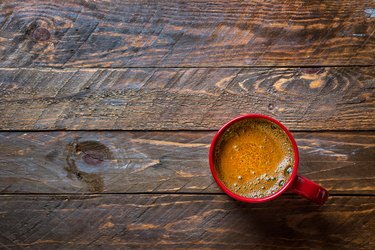
If your favorite cup of coffee or black tea is causing you to heat up, you might be feeling the effects of sweating from caffeine. While not a common occurrence, coffee sweats may happen if you're sensitive to caffeine, trying to cut back or taking a medication that doesn't mix well with your drink.
Tip
Moderate amounts of caffeine are not likely to cause uncontrollable sweating. But if you have any health issues that are triggered by caffeine, you may experience an increase in sweat production.
Video of the Day
Sweating From Caffeine
Caffeine is a stimulant that acts on the central nervous system. In general, consuming a moderate amount of caffeine may boost your energy and help you feel more alert. However, if you tend to gravitate toward the maximum recommendation of 400 milligrams a day, you may experience other adverse side effects, according to the Mayo Clinic.
Video of the Day
While certain medical conditions may interact negatively with caffeine, one group in particular that may want to take note if they are experiencing sweating from caffeine is people going through menopause. That's because data from a July 2014 Mayo Clinic study published in the journal Menopause, found an association between caffeine intake and an increase in hot flashes and night sweats in postmenopausal people. Based on these preliminary findings, the researchers suggest that limiting caffeine may help reduce the severity of both night sweats and hot flashes.
If you're sensitive to caffeine or you consume too much, you may experience an increased heart rate, irritability, restlessness, digestive complications or insomnia. While sweating uncontrollably is not typically a side effect of caffeine use, if you have a medical condition called hyperhidrosis, you may experience an increase in sweating triggered by stimulants such as caffeine.
Read more: How Many Cups of Coffee Can You Drink a Day?
What is Hyperhidrosis?
Dripping wet with sweat after a 45-minute session on the treadmill or running outdoors in a hot climate is to be expected. After all, sweating is a normal response that helps cool the body and prevents you from overheating. But when you're soaking through a t-shirt when you're not even working out, you might be wondering if the excess sweating is related to something else.
One possible cause is a medical condition called hyperhidrosis, which means too much sweating. When you're dealing with hyperhidrosis, your body sweats even when it does not need cooling, according to the American Academy of Dermatology (AAD). This type of sweating typically happens on the palms, feet, underarm or head.
If you've been diagnosed with hyperhidrosis, there are ways to decrease the episodes of excessive sweating. While treatment depends on where you're sweating the most, the AAD says applying antiperspirant to your underarms, hands, feet or hairline should be your first line of defense.
For most people, daily use of an antiperspirant is a simple solution to help manage this condition. But for some, additional treatments such as iontophoresis, or a no-sweat machine, botulinum toxin injections, prescription medication, and in rare situations, surgery to remove sweat glands is required.
Read more: Ew! Why Do I Sweat So Much When I Work Out?
Recommended Amount of Caffeine
The recommended amount of caffeine per day is up to 400 milligrams, which is considered safe for most adults, according to the Mayo Clinic. While that sounds like a lot of caffeine, if you're accustomed to drinking several cups of coffee a day, you might be surprised to learn that four cups of brewed coffee is approximately 400 milligrams. When you add that to the other sources of caffeine such as energy drinks, soda, tea, chocolate, coffee-flavored ice cream, energy bars and smoothies, it's easy to see how quickly the amount can add up.
If you're trying to cut back on your caffeine intake, you may experience withdrawals while your body adjusts. Headaches, fatigue and irritability are just some of the side effects you might notice, according to the Cleveland Clinic. To help with the transition, consider cutting back gradually. This will help decrease the severity of the withdrawal symptoms and allow you time to find non-caffeinated replacements for your favorite drink.
Some simple ways to swap out caffeine include switching to decaf or drinking herbal tea. If you're not quite ready to take the full plunge, consider a low-caffeine coffee or asking for one shot of decaf and one shot of regular at your favorite coffee shop.
- Menopause: "Caffeine and Menopausal Symptoms: What is the Association?"
- The Mayo Clinic: "Caffeine: How Much is Too Much?"
- Center for Science in the Public Interest: "Caffeine Chart"
- American Academy of Dermatology: "Hyperhidrosis"
- American Academy of Dermatology: "Hyperhidrosis: Diagnosis and Treatment"
- The Cleveland Clinic: "Caffeine and Breaking the Habit"